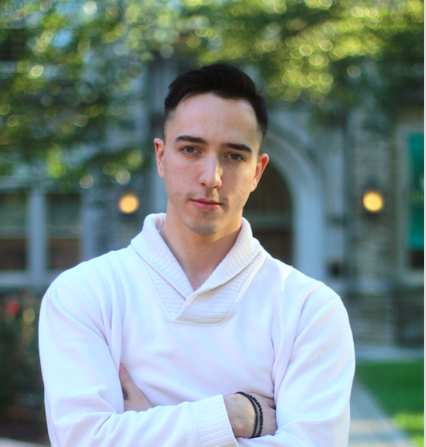“Ever since I could pick up a pencil, I wrote and drew,” explained Dragan Purković, a senior writing major who was invited to read his poetry at the Baltimore Book Festival in October. Writing is a natural means of expression for Purković, and Loyola has helped him perfect his craft to use in future endeavors. Fascinated by the concept of endings and closures, he writes to reestablish what it means when humans pass on.
Raised in Belgrade, Serbia, Purković’s writing inspirations stem from the mythological, religious and historical references that surrounded him during his childhood. He experienced the effects of the Balkan wars in the 90’s first-hand and was forced to accept the idea of endings and death early in his life. Particular poems of Purković’s like “Syria by the Sea,” and “No Man’s Land” speak about the natural cycle of birth and death and ask the readers if they have forgotten the art of letting go and appreciating endings.
“It’s not in our consciousness anymore, and that bothers me because I don’t think death has to be this scary thing. I’m just trying to find the beauty among all the negativity nowadays. A lot of the places we hear about today have so much history and so much contribution to the human spirit and heart, and now all you hear about is war and death and destruction,” he explained.
Purković uses his experiences to challenge the idea that losing someone or something is a tragic, frightening event. In his poetry, he reinforces that death is an inevitable part of life that should be embraced rather than feared.
“That was kind of personal for me because I experienced a lot of that firsthand, and so knowing that [Serbians] have something beautiful to offer as a culture, as a people, and that gets overshadowed by war and the negatives of death. It kind of just brings you back into perspective.”
An untitled work of Purković’s describes a revelation he had on a flight from Belgrade to Rome. After ascending, he noticed that the sky is always completely clear no matter what is happening beneath the clouds, which he used as a metaphor for life when one’s perspective or position is above the world’s problems.
Loyola is another place that has inspired Purković’s writing. The liberal arts curriculum has helped him learn more about his interests in mythology, religion, and history. Engaging in class discussions, even when he did not fully understand the topic, has allowed him to find new, interesting material to write about. Speaking to his accessible, knowledgeable professors has also benefited his general understanding of different subjects and his own writing.
“You’d be surprised the amount of care [professors] would take to keep you educated outside of classes,” he said. “I’ve had so many professors just say, ‘Hey, I can lend you this book.’”
Purković hopes to continue exploring the world and using his love of music as a gateway to new writing opportunities. His dream career would be in publishing or tutoring—anywhere he can help people express themselves—while working on his creative projects in hopes they will one day become the main focus.
“Helping people articulate themselves is so rewarding. But I’m a creator. I have to do something creative,” he said.
Using his experiences and passion for poetry, fiction, and music, Purković continues to normalize conversations about death in hopes of creating a more positive outlook on this natural human experience.



















































































































Anonymous • Dec 7, 2018 at 1:12 pm
4.5
Anonymous • Dec 7, 2018 at 9:45 am
5